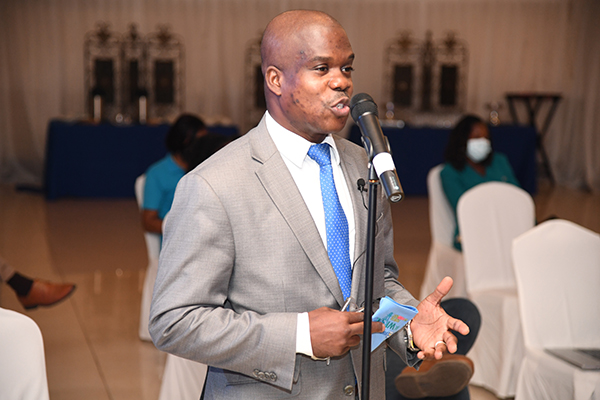Comedian Tells Young People Saving is No Joke
Popular comedian Ian ‘Ity’ Ellis is reminding young people about the importance of saving.
Drawing on part of a quotation from Earl Jarrett, Chief Executive Officer of The Jamaica National Group, Mr Ellis pointed out that “savings are not only the fuel for investments”, but that the money, which is put aside when times are good, is often what individuals and their families turn to in challenging financial times.
He was addressing the, ‘Ask Me Anything About Money’ Youth Forum, organised by the JN Foundation through its BeWi$e Financial Empowerment Programme.
The live chat was held at the Terra Nova All Suite Hotel in Kingston on Wednesday, November 25 and streamed LIVE via Facebook, Instagram and YouTube.
“This season has really taught me the value of having some money set aside. I tell my daughter that the one thing I would change if I had the power to go back in time, is that I would save more,” said the accountant and entrepreneur.
“I am blessed to be in a position where if it were not for savings, my children would discover what it is to be hungry. Therefore, I would really like to emphasise to young people that they need to develop the habit of saving, especially when they come into some earnings.”
Mr Ellis, who was a special guest at the event, stated that the global pandemic has highlighted the importance of savings in the lives of many Jamaicans. He noted that many persons are now struggling to make ends meet, due to the severe socio-economic effects of COVID-19.
“I know it is said many times on platforms such as these. However, the truth is that the message is very relevant, especially now, as so many persons are struggling, because they didn’t save at all,” he said.
Onyka Barrett Scott, general manager of the JN Foundation, agreed with Mr Ellis, advising that the rule of thumb when it comes to saving is to, “pay yourself first.”
“When you receive your pay cheque each month, no matter how small it is, try to set aside at least ten per cent of your earnings,” she recommended. “Put that ten per cent in an emergency fund and don’t touch it at all, because there is going to come a day when you will really need it.”
Mrs Barrett Scott noted that this rule applies regardless of the individual’s income.
“Many young people will say that they don’t make that much; therefore, how are they going to save ten per cent each month? But, regardless of the amount you make in salary, you can still put aside something. Start with whatever you can and gradually move towards the ten per cent over time,” she emphasised.
The “Ask Me Anything About Money” forum was geared towards young people between the ages of 16 and 30-years-old, who were interested in financial education. It addressed issues such as saving, budgeting, investments, insurance, credit cards and pivoting during the COVID-19 crisis.







